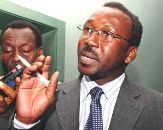Sudanese peace talks hit snag as rebels demand security guarantees
ABUJA, Oct 25 (AFP) — Peace talks on the conflict in the western Sudanese region of Darfur ran into immediate trouble as they reopened on Monday when rebel leaders refused to sign up to a deal to protect civilian refugees until they received security guarantees from the government.

|
|
JEM Representative Mohammed Tugod |
Darfur’s two rebel movements ignored pressure from African Union mediators for them to formally approve an “humanitarian protocol” designed to ensure the safety of the region’s 1.5 million displaced people, and insisted on opening talks on a parallel security arrangement first.
“The AU wants us to sign the protocol on humanitarian issues, but we said no. We will not sign it until the issue of security is thrashed out,” said the leader of the rebel Justice and Equality Movement (JEM), Mohammed Tugod.
The Sudanese Liberation Movement (SLM) backed its ally’s stance, the group’s spokesman said after the end of the morning talks session at the International Conference Centre in the Nigerian capital Abuja.
AU mediators responded by setting up a separate committee to discuss ways of demilitarising the conflict in Darfur, which has been ravaged by civil conflict since February last year, when JEM and the SLM launched a rebellion against the Khartoum government.
The two sides remain deeply divided over the security protocol.
Rebel leaders are demanding that Khartoum agree to a no-fly zone over the province, and claim that civilians are still falling victim to government air raids, despite a much violated ceasefire accord dating back to April this year.
For its part, the government wants the security deal to include the demobilisation and eventual disarmament of the rebels, an idea the insurgents have vowed to reject until they win a broad political settlement, including greater autonomy and a better share of Sudan’s oil revenues for Darfur.
“We urge our brothers in the (rebel) movements to sign the protocol on humanitarian issues because we are ready to sign it now. Now that they’ve refused, I hope that they will not further delay the work of the security committee,” said a spokesman for the government delegation, Mohammed Ibrahim.
AU officials said that the security committee would meet later Monday and from Tuesday would continue to meet in parallel to talks on a political solution, which might last three weeks or more.
Meanwhile, the rebels accused the government of continuing its air strikes.
“This is part of government’s policy to eliminate the black people of Darfur and it shows that they are not sincere about restoring peace to the region,” Tugod said, claiming that 7,000 people had fled the eastern Darfur town of Alaiet over the past three days due to aerial bombardment.
Ibrahim confirmed there had been an incident in the town, but blamed the rebels for any deaths.
The commander of the AU truce-monitoring force in Darfur, Major General Festus Okonkwo, told AFP the reports were being investigated. “We received a report from the rebels about the incident and we despatched our men to verify the claim. They are still there and we have not yet got a feedback,” he said.
The United Nations estimates that 1.5 million people have been driven from their homes during the conflict and that 70,000 civilians have been killed in the past 20 months since two rebel movements launched an uprising in Darfur.
The insurgents alleged that Darfur’s black African tribes have been politically marginalised by the Arab-led regime in Khartoum.
Khartoum responded by unleashing the Janjaweed, an Arab militia which attacked civilian communities suspected of supporting the rebellion and triggered what the United Nations has described as the “world’s worst humanitarian disaster”.
African leaders are determined that the Abuja talks will produce enough progress to convince the international community that their continent is at last ready and able to resolve its own problems.
The UN Security Council is to hold a special three-day session in the Kenyan capital Nairobi from November 18. The world body has previously threatened to impose economic sanctions on Khartoum if the killings continue.
